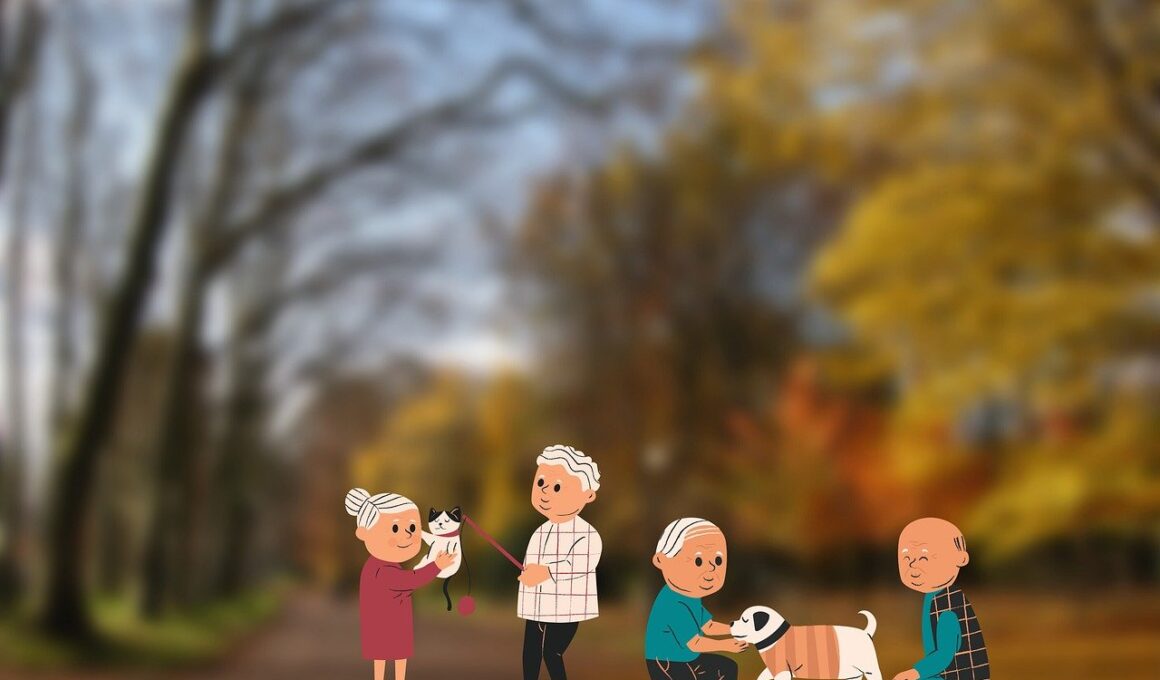Therapies to Enhance Mental Health in Elderly Dogs
As dogs age, their behavior and psychological well-being can change significantly, requiring special attention and care. Understanding the impact of aging on dog psychology is essential for pet owners. Senior dogs may experience anxiety, depression, or cognitive dysfunction, impacting their overall quality of life. Effective therapies can mitigate these issues, helping maintain mental health and emotional stability in elderly canines. Dog owners should consider utilizing various strategies to alleviate stress and promote happiness. Engaging activities, social interactions, and tailored environments contribute positively to older dogs’ lives. Additionally, mental exercises designed for older dogs can provide beneficial stimulation. Games that challenge their curiosity and learning abilities keep them energized and focused. Regular visits to the vet ensure that underlying health problems are addressed. Additionally, pet owners can encourage bonding through consistent routines, enhancing their dog’s comfort and security. Overall, proactive measures greatly support the mental health of aging dogs, reflecting the unconditional love and commitment they receive from their owners. Hence, focusing on emotional wellness is crucial for creating a fulfilling life for our senior furry companions.
One popular therapy option that shows promising results for elderly dogs is the incorporation of enrichment activities. Enrichment activities stimulate a dog’s senses, encouraging engagement with their environment. Consideration for interactive toys that stimulate curiosity is essential in keeping senior dogs mentally agile. Implementing routines that involve sensory exploration are beneficial to their emotional health as well. Activities like scent games can help engage their fading senses while providing a fun way to exercise their minds. Senior dogs can also greatly benefit from gentle socialization. Regular interactions with other well-behaved dogs, as well as humans, help alleviate feelings of isolation and promote happy behaviors. Organizing playdates or social outings can provide older dogs with valuable behavioral interactions and appropriate stimulation. Additionally, finding a safe space for these activities lowers anxiety levels. Training sessions tailored to an older dog’s abilities can maintain mental sharpness, fostering a sense of accomplishment. Utilizing low-impact games that are suited to a dog’s physical capabilities strengthens bonds and promotes joy in learning. Thus, enrichment activities become crucial pathways to enhancing the mental health of our beloved elderly dogs.
Another effective approach is considering therapeutic massage and physical therapy for elderly dogs. Gentle massage supports improved circulation and reduces muscle stiffness while fostering relaxation. This approach not only alleviates physical discomfort but also releases endorphins, which can enhance overall mood. Many dog owners have observed elevated happiness levels in their senior dogs post-massage sessions as it fosters bonding between the dog and the owner. Certified canine massage therapists can guide proper techniques to ensure safety during sessions. Additionally, physical therapy addresses mobility challenges often faced by aging dogs. Tailored exercises designed to enhance flexibility and strength help maintain independence, which is vital for a dog’s mental health. Utilizing these therapies in coordination with prescribed exercises provides more gradual physical improvement and confidence. Incorporating gentle stretches and supportive equipment, such as harnesses and mats, can boost the dog’s capability to move freely. Owners should prioritize regular assessments for effective therapeutic progress. In conclusion, physical therapies not only cater to senior dogs’ physical well-being but substantially contribute to their psychological health.
Moreover, considering nutritional aspects plays a significant role in maintaining mental health in older dogs. Proper nutrition is a foundation for overall well-being, significantly impacting cognitive function and emotional stability. Foods rich in omega-3 fatty acids and antioxidants contribute positively to brain health, enhancing memory and cognitive skills. Owners should consult their veterinarians to create appropriate dietary plans that meet their elderly dogs’ biological needs. High-quality nutrition supports both mental and physical vitality, thereby improving their mood. Supplements aimed at cognitive function can be beneficial additions to diet, particularly for dogs showing signs of age-related behavioral changes. Enrichment and social stimulation should align with dietary plans to create a holistic approach to mental health. Hydration is also crucial, as it directly affects energy levels and mood. Providing fresh water and encouraging proper hydration habits ensures dogs stay active and alert. Furthermore, pets thrive on consistent meal schedules, which can create a sense of security. Thus, focusing on nutrition forms a fundamental pillar to enhance the mental health of elderly dogs, ensuring they lead stimulating lives.
Creating a Comfortable Environment
Creating a nurturing environment for elderly dogs provides comfort often overlooked in the hustle and bustle of daily life. The home should be a safe sanctuary with easy access to essentials. Designating resting areas that accommodate any physical restrictions enables a senior dog to navigate comfortably. Soft, supportive bedding can help relieve joint pain, improving their quality of rest. A cool, quiet space can reduce stress levels for anxious dogs. Additionally, eliminating obstacles that might cause slipping or falling is crucial for their safety and peace of mind. Providing ramps or elevated surfaces can assist reluctant dogs in accessing preferred spots. Moreover, adjusting the environment to cater to dogs’ specific needs by ensuring proper lighting and temperature makes the home inviting. A secure backyard enables elderly dogs to explore without restrictions, contributing positively to their mental state. Creating a routine ensures that dogs feel stable, as familiarity supports their emotional well-being. Ensuring the space remains clean and free from distractions promotes a serene atmosphere. Overall, a thoughtfully designed environment plays a vital role in supporting the mental health of our beloved aging companions.
Regular veterinary care and consultations are imperative for understanding the specific needs of elderly dogs. Routine check-ups offer opportunities for early detection of age-related issues that could adversely affect a dog’s mental health. Maintaining a close relationship with veterinarians can help ensure that appropriate referrals to veterinary behaviorists occur when needed. These professionals specialize in identifying behavioral changes and can tailor therapies specifically designed for senior dogs. Moreover, addressing potential underlying conditions through physical examinations gives peace of mind to dog owners. As dogs age, they may experience various health challenges that can impact their behavior. For instance, pain or discomfort often manifests as anxiety or aggression. Appropriate medication tailored to their unique circumstances can vastly improve a senior dog’s emotional stability. Implementing behavioral modification strategies prescribed by qualified professionals enhances the dog-owner bond, creating an atmosphere of trust and understanding. Furthermore, regular consultations enable continuous education regarding best practices for managing aging dogs. Thus, investing in proactive veterinary care reflects a genuine commitment to the well-being of elderly dogs while promoting their mental health.
Dog owners must also acknowledge the significance of mental health and the emotional well-being of their elderly companions. Awareness and acceptance of the inevitable changes that accompany aging can foster resilience. It is essential for owners to educate themselves about various psychological conditions affected by age, including cognitive dysfunction syndrome. By recognizing potential symptoms, owners become empowered to seek assistance when necessary. Engaging with communities of fellow pet owners can provide valuable insights and support. Online forums and local support groups facilitate information exchange, connecting owners facing similar challenges. Additionally, many resources offer guidelines and recommendations for enhancing the mental health of older dogs. Owners should also explore options such as pet therapy or engaging with trained service dogs to facilitate emotional healing. By actively participating in the mental well-being of their pets, owners foster secure environments that encourage senior dogs to thrive. Ultimately, investing time, love, and attention allows for deeper connections that nourish the bond throughout a dog’s golden years. Thereby, mental health awareness becomes pivotal in enhancing the overall quality of life for elderly dogs.
In conclusion, the mental health of elderly dogs requires a multifaceted approach combining various therapies, environment modifications, nutritional considerations, and psychological support. Through understanding the specific challenges aging dogs face, owners become equipped to create enriching experiences. Activities designed to stimulate their minds alongside gentle social interactions foster a sense of fulfillment. Incorporating physical therapies, including massage and exercises, supports mobility while enhancing emotional health. Adequate nutrition directly influences cognitive abilities, impacting their overall happiness. Creating a safe, comforting home environment further nurtures emotional well-being, reflecting the love and care provided. Reliance on veterinarians offers insights into individual health requirements, promoting proactive management of psychological changes accompanying old age. Embracing mental health awareness and constant support helps owners navigate significant transitions with empathy. Ultimately, the connection between owners and their elderly dogs can blossom with open communication and understanding. Focused attention on mental health becomes a reflection of the bond formed throughout their lives together. Thus, increasing awareness and implementing strategies to improve the mental health of senior dogs enhance their final years, ensuring they feel loved and supported.


